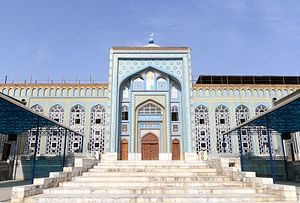Dushanbe’s mosques, according to a city spokesman cited by the AFP, will be made to install surveillance cameras and metal detectors at their expense. This is the latest measure taken by a state which is, on the surface, deeply fearful of terrorist attacks but also seems intent on exerting control over the practice of Islam in ways that human rights advocates call counterproductive.
According to the report from the AFP, citing a Dushanbe city spokesman, the city plans to install surveillance cameras and metal detectors in the city’s mosques to “guarantee security and order while preventing the emergence of undesirable trends.”
Tajikistan’s Muslim community is no stranger to the hand of the state. The State Committee on Religious Affairs and the semi-official Council of Ulema oversees the country’s imams–paying their salaries, mandating uniforms, and writing their sermons. Religious activity outside officially registered mosques has been criminalized, regardless of the teachings.
Tajikistan’s litany of harsh religion laws run counter both to its claimed secularism and the religious freedoms of its Muslim majority. As noted in the U.S. Commission on International Religious Freedom’s 2015 annual report, a 2009 Tajik law “establishes onerous registration requirements for religious groups; criminalizes unregistered religious activity and private religious education and proselytism; sets strict limits on the number and size of mosques; allows state interference with the appointment of imams; requires official permission for religious organizations to provide religious instruction and communicate with foreign co-religionists; imposes state controls on the content, publication and import of religious materials; and restricts Muslim prayer to mosques, cemeteries, homes, and shrines.”
There are also laws banning children under 18 from attending mosques and prohibiting women from wearing hijabs in government buildings and schools. Then there’s the beard shaving: in January, Tajik police in the Khatlon region said they’d shaved 13,000 beards in an “anti-radicalization campaign” and “convinced 1,773 women to stop wearing hijabs.”
The line between those participating in unregistered religious activities and extremists is blurred by blanket charges that conflate the two. Tajikistan, on the international stage, has made repeated claims that it faces a very real threat from extremists but because the state uses the same language to discuss ISIS members as it does to describe political opposition, it’s difficult to validate Dushanbe’s cries.
This is best illustrated by the rapid downfall last year of the country’s Islamist political party, the Islamic Renaissance Party of Tajikistan. The IRPT went from being the country’s nominal opposition in parliament–holding two out of 63 seats–to being labeled an extremist organization by the state in about seven months. The party’s leaders (and their lawyers) are presently on trial. The IRPT has not been labeled an extremist organization by any other country. Dushanbe’s evidence is thin, if it exists at all. In the 15 years the IRPT sat in Tajikistan’s parliament (never with more than two seats), it voiced meek dissent but at least provided a legitimate political outlet for a significant segment of Tajikistan’s population that views Islam as a fundamental part of their society.
Dushanbe has fought increasing piety in Tajik society. A quarter-century after gaining independence from the Soviet Union–which enforced strict secularization on its constituent republics to come in line with atheist Communist ideology–Tajikistan continues to wrestle with reconciling a secular political system with both Islam and the country’s other traditions.
































